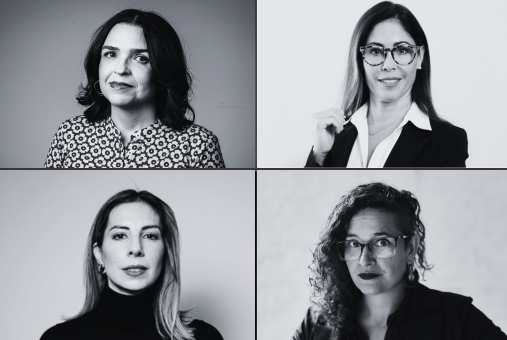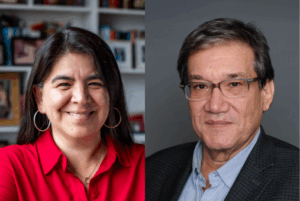Journalists covering the Caribbean, investigating regional crime and corruption and training the next generation of reporters are recipients of the 2025 Maria Moors Cabot Prize Gold Medals.
This is the second time in the history of the prize that all four medalists are women, according to Columbia Journalism School, which gives the awards.
This year’s gold medalists are Nora Gámez Torres, correspondent for the Miami Herald and Nuevo Herald in the U.S.; Omaya Sosa Pascual, co-founder of Puerto Rico’s Center for Investigative Journalism (CPI); Mexican journalist Isabella Cota of the International Consortium of Investigative Journalists (ICIJ); and Natalia Viana, co-founder of Brazil’s Agência Pública.

Clockwise from top left: Nora Gámez Torres, Omaya Sosa Pascual, Natalia Viana and Isabella Cota. (Photo: Columbia Journalism School)
Additionally, Peruvian investigative journalist Paola Ugaz and co-founder of the Gabo Foundation, Jaime Abello Banfi, were honored with Special Citations.
Founded in 1938, the Cabot Prizes recognize outstanding reporters and media organizations in the Americas. The Gold Medalists will receive a $5,000 award on Oct. 8 at Columbia University.
“At this challenging time for the news media in the Americas, the Cabot Jury has selected a truly outstanding and courageous group of journalism innovators to honor with gold medals and special citations,” said Rosental Alves, Cabot Jury chair and director of the Knight Center for Journalism in the Americas, which publishes LatAm Journalism Review (LJR).
The winners
Gámez Torres covers Cuba for the Miami Herald and its Spanish-language sister paper, El Nuevo Herald. The Cabot Prize jury called her “the most authoritative voice on the island nation in the U.S. media,” as she informs both people inside and outside Cuba.
“It's been my privilege to work at the Miami Herald and El Nuevo Herald, covering a historic decade for U.S./Cuba relations & keeping Cuban Americans (and Cubans!) informed of what's happening on the island,” she wrote on LinkedIn after the prizes were made public.
Sosa Pascual co-founded CPI, a nonprofit investigative journalism center in Puerto Rico, in 2007 and it has since made significant revelations including government corruption, the death toll from Hurricane Maria in 2017, and electoral irregularities, the jury said. It also recognized her efforts to train journalists in the Caribbean and Latin America.
Cota’s investigative reporting on political corruption and financial crimes in Latin America for outlets across the world was highlighted by the jury, which said she has “a keen eye for the everyday people affected by economic policies and security failures.”
“Saying that this is a dream come true is an understatement,” Cota posted on LinkedIn.
Viana is an investigative journalist, trainer and media entrepreneur in Brazil. The jury recognized her work across mediums: “She takes her stories from the page to the podcast, expanding both their reach and their ability to raise awareness.” The jury also recognized her role as co-founder and co-editor of of nonprofit media outlet Agência Pública, which has carried out landmark investigations into corruption in Brazil.

Special citations for the Cabot Prizes went to Paola Ugaz and Jaime Abello. (Photos: Columbia Journalism School)
Ugaz, Special Citation recipient, has been the target of harassment and lawsuits for investigating abuse in the Sodalicio de Vida Cristiana, a religious movement founded in Peru. Because of her reporting, which she carried out with colleague Pedro Salinas, Pope Francis abolished the Sodalicio in one of his final edicts.
Abello, Special Citation recipient, co-founded the Gabo Foundation (formerly the Foundation for New Ibero-American Journalism) in 1995 in Colombia. Over the years, the foundation has “benefited thousands of journalists across Latin America,” through workshops, conferences, awards and publications, the jury said.